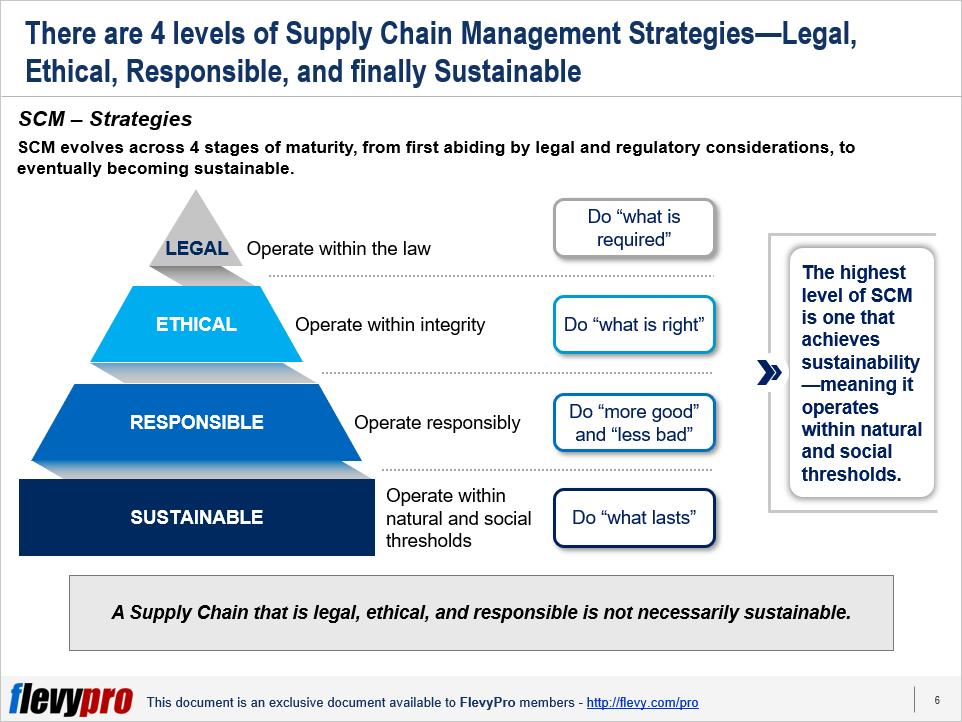In the modern age, organizations are striving to form a sustainable Supply Chain system to cope with the challenges that are arising.  Such issues include the emission of hazardous substances, excessive resource consumption, Supply Chain risks, and complex procedures.
Such issues include the emission of hazardous substances, excessive resource consumption, Supply Chain risks, and complex procedures.
Through Strategic Planning, organizations around the globe are adopting strategies to become a sustainable organization. In fact, there is an increasing trend towards organizations adopting sustainable Supply Chain Management practices.
Gaining a Foothold on Supply Chain Management
Supply Chain Management is the design, planning, execution, control, and monitoring of Supply Chain activities. It addresses the fundamental business problem of supplying products to meet demand in a complex and uncertain world.
Looking at Supply Chain Management, we can see that it draws on the value chain concept of business strategist, Michael Porter. It looks at supply issues at the multi-company level. It creates net value, builds a competitive infrastructure, leverages worldwide logistics, synchronizes supply with demand, and measures performance globally.
The need for Supply Chain Management came about when shorter product life cycles and greater product variety has increased Supply Chain costs and complexity. And as outsourcing, globalization, and business fragmentation became a common practice, there was now the need for Supply Chain integration. This was further emphasized with the advances in emergent technologies. which created more opportunities for Digital Transformation within Supply Chains.
The 4 Levels of Supply Chain Management Strategies
There are 4 Levels of Supply Chain Management Strategies. The first 3 strategies are foundational Supply Chain Strategies.
Before any Supply Chain can be considered sustainable, there are 3 foundational Supply Chain Strategies that need to be undertaken.
- Legal Supply Chain Strategy. There are a number of legal rules and regulations that need to be followed by organizations. The Supply Chain Strategy must cater to all legal rules. An example is a ruling according to the Restrictions of Hazardous Substances Directive (RoHS) wherein an organization must not rely on the mercury, cadmium, and chromium as they result in huge emission of hazardous substances.
- Ethical Supply Chain Strategy. To become an ethically strong organization, it is required that the organization operates with integrity and focus on what is right. The organization could develop a policy that governs the organization’s operations. It is also essential that the Supply Chain quality assurance team that is built complies with ethical sustainability.
- Responsible Supply Chain Strategy. To become responsible, the organization could spend resources in compliance with sustainable rules. The organization could set up training and development programs to drive sustainability within the organization. It can also focus on environment-friendly activities to boost its social responsibility.
Before an organization can become sustainable, significant efforts must be exerted to put the 3 foundational Supply Chain Strategies in place within the organization.
Reaching the Level of Sustainability
Sustainable Supply Chain Strategy has become increasingly important as more and more organizations are focusing on putting it in place. According to the MIT Slogan Review, over 75% of organizations listed in the S&P 500 reported sustainability reports where it shows that catering up to the responsibility is becoming highly challenging and important. There has been a significant increase and inclination towards sustainability and this depicts the importance of becoming sustainable.
With the passage of time, it has become evident that organizations around the globe are becoming fond of sustainable considerations.
Interested in gaining more understanding of Supply Chain Sustainability? You can learn more and download an editable PowerPoint about Supply Chain Sustainability here on the Flevy documents marketplace.
Are you a management consultant?
You can download this and hundreds of other consulting frameworks and consulting training guides from the FlevyPro library.

Comments